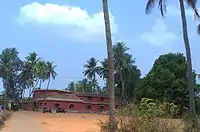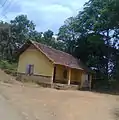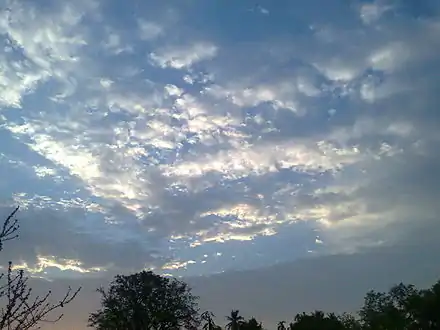Peranankila
Peranankila or Pernankila is a village near Hiryadka of Udupi taluk and Udupi district. It is a mid-sized village located in the district of Udupi in the state of Karnataka in India. It had a population of about 2147 persons living in around 427 households according to 2001 census. There is an anganavadi kendra and a primary school in this village. There is a primary health center at the distance of nearly 0.5 km from Peranankila temple. There are two shops near Peranankila temple where people get items for daily use as well as items required for Pooja's.
Peranankila
Pernankila | |
|---|---|
village | |
| [[File:Kodimara, Ganapathi Temple, Pernankila.jpg
cha|250px|Pernankila Temple]] Pernankila Temple | |
 Peranankila Location in Karnataka, India  Peranankila Peranankila (India) | |
| Coordinates: 13°17′51″N 74°50′35″E | |
| Country | |
| State | Karnataka |
| District | Udupi |
| Languages | |
| Time zone | UTC+5:30 (IST) |
| PIN | 576113 |
| Nearest city/town | Manipal, Hiriyadka |
| Website | pernankila |
The divine abode of Lord Mahalingeshwara [Lord Shiva] and Shri Mahaganapathi [Lord Ganesha] is situated in Pernankila which is about 20 km southeast of Udupi. A pond adjacent to temple was rebuilt by Late P.Narasimha Acharya on 1-8-1950. The Ganesha deity is believed to remove obstacles from one's life. The Ganapati here is called Udbava Ganapati as it is believed to have come from earth by itself.
During the annual fair of the temple, a chariot of the temple is pulled by many devotees with statues of god placed in it. Ganesh Chaturthi is the holiest day here. Thousands of devotees visit this temple on that day and offer their prayers. Devotees believe that Lord Mahaganapathi bless them and fulfills their wishes.
Special poojas and celebrations are held during the Ganesh Chaturthi, during which nearly 2,000 devotees visit the temple and participate in the meal (annasantarpane) that is served on that day. Besides religious functions, cultural events are also organised on the Ganesh Chaturthi day in the temple. On the day of Ekadashi the meals are not served, the people maintain fast and offer prayers to god.
During Meena in the month of March–April, on the full moon day the festivities start with the hoisting of the temple flag and Rathotsava is also organised on that day. On Tuesdays, that too if Sankashti falls on that day, the number of devotees visiting the temple increases manifold. At the end of month December bhajane's are sung and competitions are held.
It is believed that the Pernankila Shri Mahaganapati is fond of appams prepared out of rice, coconut, ghee and jaggery. On the Ganesh Chaturthi day nearly one quintal rice is used to prepare 50,000 appams and distribute among the devotees. Every month nearly 70,000 appams are prepared and distributed as ‘prasad’ to the devotees who visit the temple.
The kopparegeappa seva is provided the temple where devotees offer prayers to god by and annasantharpane is made to devotees of god. The Ganapathi Vigraha is in a well. The temple priests belong to the Saralaya Brahmin caste.
The majority of people in the village belong to Rajapur Saraswat Brahmins.
The bhoota is Panjurli. It is located in a small hut in a field. The Nagas are under a huge tree.
Main Occupation
Mainly people travel to Manipal for occupation, there is a cashew factory where people work. This village is dotted with paddy fields, coconut, arecanut plantations, cashew plantations, a variety of vegetable plantations and forests.
How to reach
Devotees can reach Pernankila by three separate routes. The first one is through Alevoor-Marne Road (1 km. from Marne). The second one is through Parkala via Patla route (about 2 km. from Patla). The third route is through Onthibettu near Hiriyadka (about 8 km. from Onthibettu). This route has a good number of service buses travelling from Udupi through Manipal to Peranankila. From morning to 8pm at night, there are good numbers of private busses for every half an hour from Udupi to Pernankila.
Photos of Pernankila
 Pond of Pernankila temple
Pond of Pernankila temple Ganapathi Devasthana, Pernankila
Ganapathi Devasthana, Pernankila Place where second chariot [chandra mandala] is kept
Place where second chariot [chandra mandala] is kept Band called as nagari in tulu language
Band called as nagari in tulu language
History



It is believed that in Pernankila, the Lord Mahaganapathi is a Udbhava deity, who is also known as Swayambhoo (self incarnation). The divine idol of Mahaganapathi here was said to have been found by a lower class (scheduled caste) dalit farmer called Perna while ploughing his farm. The idol of Mahaganapathi hidden under the earth accidentally got stuck to his plough. As a result, the head portion of the idol was torn apart and blood gushed out of it. The farmer was awe stuck on seeing this unusual scene.
Severely perturbed Perna went to his home that day and saw an unusual dream that night. In his dream, Perna was ordained to keep upside down two Koppariges (jar that contains hidden treasure), one at the place where he found the Mahaganapathi Idol in his farm and the other near the Shivaalaya (the Shiva temple) and visit the two spots next morning.
Perna did according to the divine order which he received in his dream. To his surprise, when he visited the spots next day, he saw the place absolutely vacant where he originally found the Mahaganapathi idol, but located the same near the Shivaalaya under the Kopparige which he had placed upside down. Later, the idol was found in a nearby well and its upper portion was only visible. From that day, the village came to be known as Perna+Ankila (the plough), Pernankila.
It is widely believed that with the blessings of Lord Mahaganapathi, the dalit farmer Perna's name was immortalized and the village itself came to be identified with his name and the plough, i.e., Pernankila.
One of the epic stories says that one Kharasura established Lord Mahalingeshwara here thousands of years ago. During the reign of Alupas, it is believed, a temple for Lord Mahalingeshwara was constructed here. Historians believe that the existing structure of the temple is more than a thousand years old.
It is learnt from a rock edict found here that one Alupa queen had constructed the Mahalingeshwara temple here. But the tragedy is that historians have not been able to read the rock edict fully till date. It was renovated 1950s. During this renovation large stones were carved by many architectures and then stones were brought near temple by elephants and then temple was built.
Language
Tulu is the most widely spoken language in Peranankila. Kannada and Rajapur konkani are also spoken by many people.
Climate
The climate in Peranankila is hot in summers and mild in winter. During summers(from March to May) the temperature reaches up to 35 °C and in winters (from December to February) it is usually between 32 °C and 20 °C.
The Monsoon period is from June to September with one of the rainfall averaging more than 4000mm every year and heavy winds.
| Climate data for Peranankila | |||||||||||||
|---|---|---|---|---|---|---|---|---|---|---|---|---|---|
| Month | Jan | Feb | Mar | Apr | May | Jun | Jul | Aug | Sep | Oct | Nov | Dec | Year |
| Average high °C (°F) | 32.8 (91.0) |
33 (91) |
33.5 (92.3) |
34 (93) |
33.3 (91.9) |
29.7 (85.5) |
28.2 (82.8) |
28.4 (83.1) |
29.5 (85.1) |
30.9 (87.6) |
32.3 (90.1) |
32.8 (91.0) |
31.5 (88.7) |
| Average low °C (°F) | 20.8 (69.4) |
21.8 (71.2) |
23.6 (74.5) |
25 (77) |
25.1 (77.2) |
23.4 (74.1) |
22.9 (73.2) |
23 (73) |
23.1 (73.6) |
23.1 (73.6) |
22.4 (72.3) |
21.2 (70.2) |
23.0 (73.3) |
| Average precipitation mm (inches) | 1.1 (0.04) |
0.2 (0.01) |
2.9 (0.11) |
24.4 (0.96) |
183.2 (7.21) |
1,177.2 (46.35) |
1,350.4 (53.17) |
787.3 (31.00) |
292.1 (11.50) |
190.8 (7.51) |
70.9 (2.79) |
16.4 (0.65) |
4,096.9 (161.30) |
Gallery
 Mahaganapathi Temple on the day of Annual Fair
Mahaganapathi Temple on the day of Annual Fair.jpg.webp) Inscription showing pond rebuilt by P.Narasimha Acharya
Inscription showing pond rebuilt by P.Narasimha Acharya The Chariot which carries statues of god on the day of annual fair
The Chariot which carries statues of god on the day of annual fair Devotees on the day of annual fair
Devotees on the day of annual fair Mahaganapathi Temple Pernankila on the night of rangapooje
Mahaganapathi Temple Pernankila on the night of rangapooje Peranankila temple
Peranankila temple Anganavadi Kendra
Anganavadi Kendra Cashew Factory at Peranankila
Cashew Factory at Peranankila Post Office
Post Office Way to Peranankila
Way to Peranankila The rear view of Peranankila temple
The rear view of Peranankila temple Ganahoma on ganesh chaturthi 2012
Ganahoma on ganesh chaturthi 2012 Temple premise
Temple premise
External links
| Wikimedia Commons has media related to Peranankila. |
